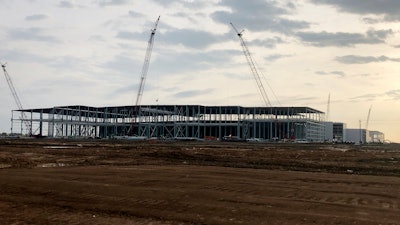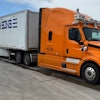
STANTON, Tenn. (AP) — A new Ford assembly plant being built in western Tennessee will be able to build up to 500,000 electric pickup trucks per year at full production, the company said Friday.
The Dearborn, Michigan, automaker announced in September of 2021 that it would build the plant and a battery factory on a 3,600-acre (1,460-hectare) parcel of land in rural Stanton, northeast of Memphis.
Known as the Memphis Regional Megasite, the land designated by the state for industrial development sat unused for years before Ford decided to move in.
Construction on the site, named BlueOval City, began last year. Ford has said it plans to start production by 2025, and it said Friday that timetable remains in place. The automaker also said its second-generation electric truck is "code named Project T3."
Ford's assembly plant and a battery plant run by a joint venture called BlueOvalSK will employ about 6,000 people with an investment of roughly $5.6 billion, Ford said.
BlueOvalSK will also construct twin battery plants in Glendale, Kentucky, in an estimated $5.8 billion investment. The projects are expected to create an estimated 10,800 jobs and shift the automaker's future manufacturing footprint toward the South while putting an emphasis on green energy.
Ford says the Tennessee plant is designed to be its first carbon-neutral vehicle manufacturing campus and it will have a 30% smaller general assembly footprint than traditional plants. Ford also said it will use recovered energy from the site to provide carbon-free heat for the assembly plant and save water by reducing evaporation from the site's cooling towers.
Before landing the Ford project, Tennessee had invested more than $174 million in the Memphis megasite but struggled to lure the big tenant it wanted to the Haywood County location. Tennessee lawmakers have committed to spending nearly $900 million on state incentives, infrastructure upgrades and more as part of a sweeping plan with Ford. The agreement included $500 million in capital grant funds.
The lease essentially grants the land to Ford through December 2051. The rent is $1 for the entire lease term.
Some of the rural West Tennessee counties surrounding the plant hope it will help boost their economies.
With an economy based largely on farming, Haywood County saw its population shrink by 4.9% to 17,864 people from 2010 to 2020, one of 14 counties to lose population as Tennessee grew as a whole by 8.9%, according to census data.
The factory is expected to bring both small and large businesses to the area, including hotels, restaurants, health care facilities and suppliers for the plant, among others. Real estate values also could increase.
Ford's leaders have pledged to help the communities near the plant. The Ford Motor Co. Fund announced Friday it has awarded 17 capital grants of $75,000 to $100,000 each to fire departments, arts and parks conservancy groups, a community center, local governments and other organizations in six counties.
The $1.2 million grant program received 200 applications, said Mary Culler, president of the Ford Motor Company Fund.
"Those are the kinds of grass-roots, capital projects that these towns and municipalities are looking for," Culler said.






















